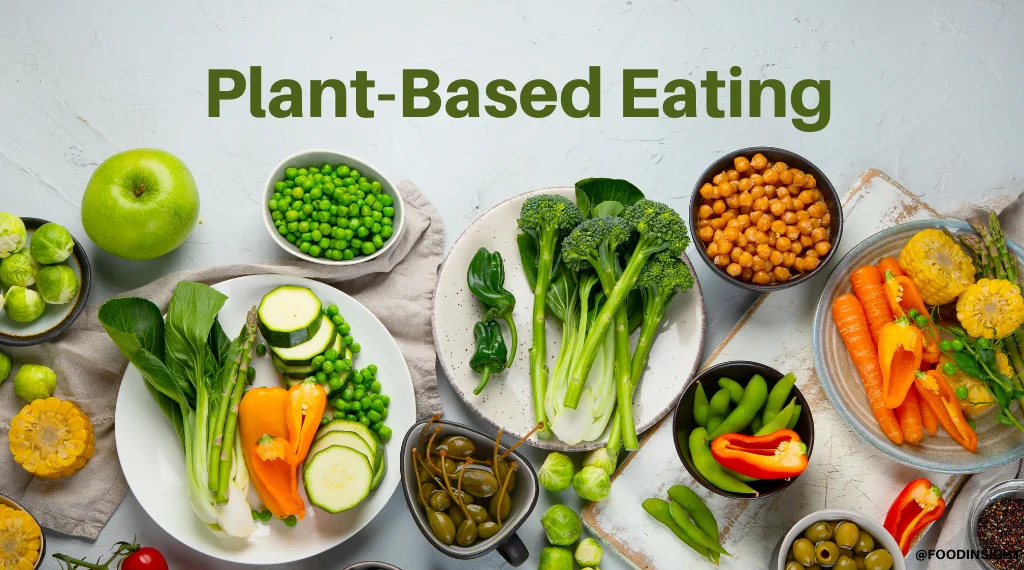The Science Behind Why BBQ Sauces Make Plant-Based Dishes Irresistible
The Science Behind Why BBQ Sauces Make Plant-Based Dishes Irresistible
Blog Article
All About Healthy Food: Advantages of Embracing Plant Based Options
The conversation bordering plant-based diet regimens has actually gotten considerable attention recently. Many individuals are checking out the potential health and wellness benefits, nutritional advantages, and environmental effects linked with these nutritional options. As people come to be a lot more conscious of their food's influence on well-being and sustainability, inquiries arise about the practicalities of adopting such a lifestyle. What certain changes can one expect, and exactly how might these selections improve not only personal health yet also the planet's future?
Recognizing Plant-Based Diet Regimens
Although lots of individuals link plant-based diets primarily with vegetarianism or veganism, these diet regimens can include a large range of consuming patterns that prioritize entire, minimally refined plant foods. Such diet plans usually consist of fruits, vegetables, entire grains, seeds, beans, and nuts, while eliminating or limiting pet products. This adaptability enables individuals to tailor their nutritional choices according to personal choices and dietary needs. Some may adopt a largely plant-based diet plan while still sometimes consuming meat or dairy products, frequently described as a flexitarian technique. The emphasis stays on integrating more plant foods, which can result in a diverse variety of meals and tastes. Comprehending these different interpretations of plant-based consuming is important for appreciating its accessibility and charm in contemporary food society.
Health Perks of Plant-Based Foods
The wellness advantages of plant-based foods are substantial, using a nutrient density advantage that sustains general health. Research indicates that these foods can improve heart health and wellness and play a crucial role in reliable weight management. By incorporating much more plant-based alternatives, people may boost their nutritional options and advertise lasting health.
Nutrient Density Benefit
Nutrient thickness plays an essential duty in the wellness benefits of plant-based foods, making them a compelling choice for those looking for a well balanced diet plan. Plant-based foods, such as fruits, vegetables, vegetables, nuts, and entire grains, are typically abundant in vital vitamins, minerals, and antioxidants while being lower in calories. This high nutrient density allows people to eat fewer calories while still fulfilling their dietary requirements. In addition, these foods are packed with nutritional fiber, advertising digestion health and wellness and helping in weight management. By incorporating nutrient-dense plant-based options, customers can boost their total health, sustain their body immune systems, and lower the risk of chronic diseases. Eventually, the nutrient density of plant-based foods underscores their significance in a health-conscious way of living.
Heart Health Enhancement

Weight Administration Assistance
In addition to advertising heart wellness, a plant-based diet can substantially assist in weight monitoring. This dietary approach stresses entire foods such as fruits, vegetables, beans, nuts, and entire grains, which are typically reduced in calories and greater in fiber compared to animal-based products. The high fiber material assists boost satiety, minimizing overall calorie intake. Additionally, plant-based diet regimens are often rich in necessary nutrients while low in harmful fats, making it easier to preserve a healthy weight. Sugar Free Sauces. Research study indicates that individuals that take on a plant-based way of life often tend to have reduced body mass indexes (BMIs) and experience more successful weight reduction compared to those who consume meat-heavy diet plans. Consequently, welcoming plant-based choices is a critical choice for reliable weight administration
Nutritional Worth of Plant-Based Components
Plant-based ingredients are rich in essential nutrients, supplying a varied array of vitamins, minerals, and antioxidants that add to general health and wellness. A comparison of healthy protein resources discloses that while pet products are usually considered as premium, numerous plant-based alternatives give ample protein and other useful substances. Recognizing the dietary value of these ingredients can assist individuals make informed dietary options.
Essential Nutrients in Plants
Nutrient-rich components discovered in plants provide a diverse array of crucial minerals and vitamins that add considerably to general health and wellness. These ingredients are rich in vitamins A, C, and K, which sustain immune function, vision, and blood clotting, specifically. Furthermore, plants offer important minerals such as potassium, magnesium, and calcium, crucial for heart wellness, muscle mass function, and bone stamina. The presence of fiber in plant-based foods help digestion and promotes a healthy intestine microbiome. Anti-oxidants, discovered abundantly in vegetables and fruits, aid battle oxidative stress and minimize inflammation. In addition, numerous plant foods article are reduced in calories yet high in nutrients, making them an exceptional choice for those looking for to preserve a healthy and balanced weight while making sure ideal nutrient consumption.
Contrasting Protein Sources
Healthy protein resources differ significantly in their nutritional accounts, with plant-based components using distinct advantages. Unlike pet healthy proteins, which typically include saturated fats and cholesterol, plant healthy proteins have a tendency to be lower in these unhealthy parts. Legumes, nuts, seeds, and whole grains are rich in crucial amino acids, fiber, vitamins, and minerals. Lentils provide high healthy protein content together with significant iron and folate, while quinoa is a full protein, supplying all nine essential amino acids. In addition, plant-based proteins are usually gone along with by antioxidants and phytochemicals that support general wellness. The change to plant-based protein resources not only boosts nutritional consumption but likewise aligns with sustainable nutritional methods, lowering environmental influence and promoting lasting health benefits.
Ecological Impact of Plant-Based Consuming
As recognition of climate modification expands, numerous people are exploring sustainable nutritional selections that can significantly decrease their environmental footprint. Plant-based consuming has actually become a considerable factor to reducing greenhouse gas discharges, which are primarily connected with animals manufacturing. The cultivation of fruits, grains, vegetables, and veggies normally calls for fewer resources, such as water and land, compared to animal farming. Furthermore, plant-based diet plans can bring about lowered logging, as less land is needed for grazing livestock or growing animal feed. By shifting towards plant-based choices, consumers can support biodiversity and promote healthier environments. On the whole, welcoming plant-based consuming not just advantages individual health and wellness right here yet likewise stands for a crucial action towards ecological sustainability and preservation initiatives.
Conquering Common Misconceptions
While lots of people identify the advantages of a plant-based diet regimen, numerous false impressions frequently deter them from fully embracing this way of living. An usual idea is that plant-based diet plans lack adequate protein; nonetheless, many plant sources, such as beans, nuts, and tofu, offer ample healthy protein. Furthermore, some assume that this diet regimen is pricey, when actually, staples like beans, rice, and seasonal vegetables can be quite inexpensive. Another misconception is that plant-based consuming is excessively restrictive, whereas it in fact provides a diverse selection of flavors and foods. Ultimately, numerous worry that a plant-based diet regimen may lead to shortages, yet with proper preparation, individuals can get all needed nutrients, including nutrients, while taking pleasure in a wide range of tasty dishes.
Tips for Transitioning to a Plant-Based Way of living
Making the shift to a plant-based way of life can be an improving experience, though it usually needs some guidance to browse the preliminary adjustments. People are urged to start gradually, integrating even more fruits, veggies, legumes, and whole grains right into their dishes while reducing meat and dairy usage. Dish planning is necessary; preparing a weekly menu can assist alleviate the adjustment and prevent last-minute undesirable options. Discovering cooking methods and new recipes can likewise improve the experience and preserve exhilaration concerning plant-based official source consuming. Additionally, joining support groups or communities can provide motivation and share important suggestions. Lastly, staying notified about nutrition guarantees balanced dishes, preventing deficiencies while cultivating a healthy and balanced, enjoyable plant-based way of living.
Delicious Plant-Based Dish Ideas
Checking out scrumptious plant-based meal ideas can motivate people to embrace a much more nourishing diet. One prominent alternative is a passionate quinoa salad, featuring cherry tomatoes, cucumber, and a spicy lemon-tahini clothing. Another favorite is a mouthwatering lentil stew, loaded with carrots, celery, and fragrant herbs, ideal for a soothing supper. For breakfast, overnight oats made with almond milk, chia seeds, and topped with fresh berries offer a healthy beginning to the day. Additionally, a dynamic vegetable stir-fry with tofu and a range of vibrant veggies can be a fast yet pleasing dish. Ultimately, creamy avocado toast on whole-grain bread, sprinkled with seeds and spices, uses a straightforward yet savory treat. These dishes display the selection and splendor of plant-based consuming.

Often Asked Questions
Can a Plant-Based Diet Regimen Offer Enough Healthy Protein?
The question of whether a plant-based diet regimen can supply sufficient healthy protein is typical. Numerous resources, including beans, nuts, seeds, and whole grains, can fulfill protein requires efficiently, sustaining a healthy and balanced diet for people.
Are Plant-Based Diet Plans Ideal for Children?
The viability of plant-based diet plans for youngsters depends upon mindful planning. Ample nutrients should be assured, including minerals, proteins, and vitamins. With correct guidance, such diet plans can sustain healthy development and growth in children.
Exactly how Do I Eat Out on a Plant-Based Diet?
Eating out on a plant-based diet includes looking for restaurants with diverse menus, requesting for modifications, and checking out vegan-friendly alternatives. Preparation ahead and interacting nutritional choices can boost the dining experience while preserving nutritional selections.
What Prevail Allergens in Plant-Based Foods?
Common allergens in plant-based foods consist of soy, gluten, nuts, and seeds - Plant Based Chicken. Individuals adhering to a plant-based diet regimen should know these allergens and check out tags meticulously to stay clear of adverse reactions and guarantee safe usage
Can Plant-Based Diets Aid With Fat Burning?
Research indicates that adopting a plant-based diet may facilitate weight reduction because of its usually lower calorie density and higher fiber content. This combination can enhance satiety, helping people handle their calorie consumption successfully. Lots of people link plant-based diets generally with vegetarianism or veganism, these diets can include a vast array of consuming patterns that focus on whole, minimally processed plant foods. Nutrient thickness plays an essential duty in the wellness advantages of plant-based foods, making them a compelling choice for those seeking a well balanced diet plan. Plant-based diet plans have been revealed to substantially boost heart health and wellness, as they commonly include elements that sustain cardio function. In enhancement to promoting heart health, a plant-based diet regimen can significantly help in weight management. An usual belief is that plant-based diets do not have sufficient healthy protein; nevertheless, numerous plant resources, such as vegetables, nuts, and tofu, provide enough protein.
Report this page